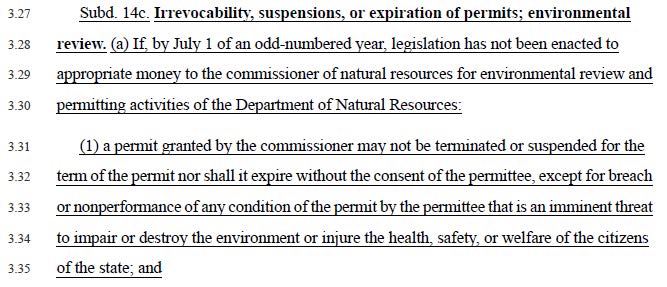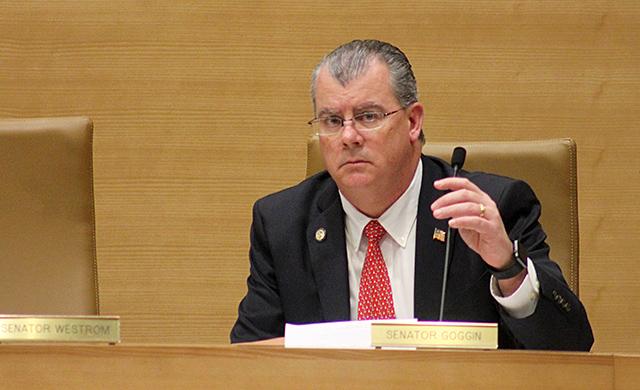Killing the EQB and gutting environmental law!
March 13th, 2017
 Lake Pepin on a very warm blustery day last week
Lake Pepin on a very warm blustery day last week
There’s a bill out there that will eliminate Minnesota’s Environmental Quality Board and shove that work over to the MPCA, at the same time, gutting DNR and MPCA review by linking to funding or lack thereof. Shifting preparation of environmental documents to the project applicant. This is not crying wolf, this is happening, it is going through committees in both House and Senate, and I’m at a loss to describe how awful this is. Here’s the point, in short:

Mindful that defunding is a primary means to neuter an agency, check this, for the DNR, but repeated as amendment to 116.07 for Pollution Control Agency in lines 10.3-10.15:

 Look at line 3.32 “nor shall it expire without the consent of the permittee.” Gutting DNR and MPCA authority. Failure to fund agencies is such a problem that the MPCA has a backlog of expired permits. This means that permits would go on and on and on, because permit violations are not usually an “imminent threat” but instead a long term cumulative impact.
Look at line 3.32 “nor shall it expire without the consent of the permittee.” Gutting DNR and MPCA authority. Failure to fund agencies is such a problem that the MPCA has a backlog of expired permits. This means that permits would go on and on and on, because permit violations are not usually an “imminent threat” but instead a long term cumulative impact.
How about this — earth to Mars, environmental review is not decisional, nothing should be deemed approved because an EIS is approved:

The project applicant prepares the Draft Environmental Impact Statement? WHAT?!?!

Still picking out more specifics…
Bottom line, Minnesotans, here’s the “TO DO” of the day. Contact the House and Senate authors, and send a quick round of emails or call the House Ways & Means and Senate Environment and Natural Resources Finance. Focus on the authors and Republican members. Tell them to vote this bill DOWN! Contact info below.
Here are the House authors:
rep.dan.fabian@house.mn (651) 296-9635, rep.dale.lueck@house.mn (651) 296-2365, rep.steve.green@house.mn (651) 296-9918, rep.josh.heintzeman@house.mn (651) 296-4333
House status: TEXT. On March 8th it was re-referred to House Ways & Means Committee. No meeting scheduled yet. Contact the House Ways & Means Committee members — their emails:
rep.jim.knoblach@house.mn, rep.bob.vogel@house.mn, rep.lyndon.carlson@house.mn, rep.sarah.anderson@house.mn, rep.dave.baker@house.mn, rep.tony.cornish@house.mn, rep.greg.davids@house.mn, rep.matt.dean@house.mn, rep.bob.dettmer@house.mn, rep.steve.drazkowski@house.mn, rep.dan.fabian@house.mn, ep.pat.garofalo@house.mn, rep.bob.gunther@house.mn, rep.rod.hamilton@house.mn, rep.alice.hausman@house.mn, rep.debra.hilstrom@house.mn, rep.frank.hornstein@house.mn, rep.tina.liebling@house.mn, rep.jenifer.loon@house.mn, rep.paul.marquart@house.mn, rep.erin.murphy@house.mn, rep.bud.nornes@house.mn, rep.gene.pelowski@house.mn, rep.jeanne.poppe@house.mn, rep.paul.torkelson@house.mn, rep.dean.urdahl@house.mn, rep.jean.wagenius@house.mn
Here are the Senate authors:
sen.bill.ingebrigtsen@senate.mn (651) 297-8063, sen.carrie.ruud@senate.mn (651) 296-4913, Sen. Paul Gazelka (link to form)(651) 296-4875, Sen. David Tomassoni (link to form)(651) 296-8017.
Senate Status: TEXT – was Amended and amendment not posted. TWO Committee meetings scheduled, one TODAY, BUT status is conflicting:
| Committee on State Government Finance and Policy and Elections | |
| 03/13/2017 | Meeting scheduled for 05:30 PM in Room 1200 Minnesota Senate Bldg. |
| 03/13/2017 | No Committee Action Recorded |
| Committee on Environment and Natural Resources Finance | |
| 03/15/2017 | Meeting scheduled for 10:30 AM in Room 1150 Minnesota Senate Bldg. |
Here’s the conflict, says it’s already been through State Gov’t Finance despite above 5:30 schedule!
| 03/13/2017 | |
|---|---|
|
|
So I think the best bet is to contact Environment & Natural Resources Finance:
sen.bill.ingebrigtsen@senate.mn, sen.carrie.ruud@senate.mn, sen.erik.simonson@senate.mn, sen.bill.weber@senate.mn
And links to those using web form: Sen. David Tomassoni, Sen. Thomas Bakk, Sen. Dziekic, Sen. Justin Eichorn, Sen. Foung Hawj, Sen. Mark Johnson, Sen. Andrew Lang, Sen. Andrew Mathews,
Employers of H2A workers avoid overtime after 48 hours?
March 11th, 2017

This is “my” state Senator, Mike Goggin. He’s pushing SF 899, a bill that would exempt employers from paying overtime to H2A workers who work more than 48 hours a week. WHAT?!?!
Contact Sen. Mike Goggin!
I’ve been keeping an eye on him because he’s our latest “Senator from Xcel,” following Sen. Steve Murphy (January 5, 1993 – January 3, 2011). And with reason… he’d been carrying water for Xcel Energy, sponsoring a bill to allow Xcel, his employer, to circumvent the Certificate of Need requirement, that a utility prove up “need” and that it is least cost, before building. Alan Muller wrote a letter which the STrib printed that was published on February 7:
A pair of bills oozing their way through the Legislature are a giveaway to Xcel Energy:
HF113/SF85 would (1) authorize Xcel to build a new power plant without getting a Certificate of Need from the Public Utilities Commission; (2) require the PUC to make Xcel customers pay for it, and (3) establish a scheme for an inflated rate of return for the plant.
These bills are discreditable to all the legislators involved, but especially concerning is that one of the Senate authors, Mike Goggin, who represents my district (21), is an Xcel manager.
Sen. Goggin’s authorship of a bill so flagrantly benefiting his employer at the expense of his constituents should be considered an ethics violation.
Alan Muller, Red Wing, Minn.
On January 19th, the House amended the companion bill, HF113, to include language making Xcel Energy’s gas plant subject to some scrutiny, and then turned around and took it OUT on the floor February 9. Goggin withdrew as an author on February 16, 2017 (p. 645). Governor Dayton signed it on February 28, 2017.
So on to SF 899.
Only two Senate authors listed, Senators Goggin and Weber. Goggin moved that it be pulled it from Agriculture, Rural Development and Housing Finance and forwarded to Agriculture, Rural Development and Housing Policy, which passed. On March 2, it was removed from that Committee agenda, and then labeled as “PENDING REFERRAL.” It seems to have stalled out. ???
So on the House side, it’s HF 1032. Only two authors here too, McDonald and Anderson, P. From the minutes, “Representative Pierson renewed his motion that HF1032 be re-referred to the committee on Job Growth and Energy Affordability Policy and Finance. THE MOTION PREVAILED.” Listen to the House committee hearing starting at 27:06 to 1:14:50 (my comments in parens). This has been re-referred to Job Growth and Energy Affordability Policy and Finance.
- $12.75 an hour average (and employer pays transportation from country of origin to site, housing, meals or kitchen facilities) – tape at 28:06
- about a year and a half ago, farmers raised question as to whether overtime rule applies and found it does apply – tape at 28:40
- a worker cannot provide enough produce in an hour to justify overtime, produce left in the fields – tape at 28:50
- “This bill was up a couple years ago” hmmmmmmmm, it didn’t pass tape at 37:55
- Adding up the transportation, housing, meals/kitchenette, that comes to average of $17-19/hour, add the overtime and we just can’t afford that – tape at 43:40
- What is the behavior in the broader field? Grievances brought, settlement, year or two ago, maybe longer – tape at 45.38
- We don’t have enough people in Minnesota that will do this kind of work (at these long hours!?!) – tape at 49:18
- For $17-19/hour, I think people would show up, wondering about efforts done, have you tried to offer that kind of wage, attract local Minnesotans? It’s seasonal employment… – tape at 52:24
- “those workers don’t pay taxes, while they’re here” (is that true? Yes, but, or no, but, here’s the scoop) tape at 54:15
- We’ll hire you if you can walk or breathe, that’s how short we are – tape at 56:07
- We’re obligated under federal rules to advertise at $12.75 (not limited to $12.75, but must advertise at least $12.75, and could but don’t advertise for $17-19) – tape at 56:19
- Do any of these workers have other jobs? We’re not allowed to allow them to work at any other place by the statute they’re committed to working under the contract they’ve signed with us as an employer (and they can’t therefore just quit, this is NOT “at will” employment where they have the option to quit, they’re stuck) – tape at 1:10:25
- They’re just trying to be in compliance with the federal law (?!?) – tape at 1:13:21
How is this not a case where the market has spoken and the employers must pay the freight rather than exploit the workers? To get H2A visa workers, they must demonstrate that they cannot find US workers to hire. Do they offer that $17-19/hour to local/US workers? Given the “fight for $15” minimum wage campaign across the nation, methinks that they wages they’re offering generally are not even close.
What to do? Contact House Job Growth and Energy Affordability Policy and Finance. Ask that they reject HF1032, that this is not in the public interest, workers deserve overtime pay, and pick and chose from reasons above, listen to the tape if you have time, to get a feel for the issues.
rep.pat.garofalo@house.mn, rep.jim.newberger@house.mn, rep.karen.clark@house.mn, rep.tim.mahoney@house.mn, rep.jean.wagenius@house.mn, rep.paul.anderson@house.mn, rep.cal.bahr@house.mn, rep.dave.baker@house.mn, rep.jim.davnie@house.mn, rep.dan.fabian@house.mn, rep.jeff.howe@house.mn, rep.sandy.layman@house.mn, rep.erin.mayequade@house.mn, rep.jason.metsa@house.mn, rep.rena.moran@house.mn, rep.anne.neu@house.mn, rep.marion.oneill@house.mn, rep.jason.rarick@house.mn, rep.peggy.scott@house.mn, rep.mike.sundin@house.mn, rep.paul.thissen@house.mn, rep.bob.vogel@house.mn, rep.nolan.west@house.mn
#notmyPresident – Keystone XL pipeline is baaaaaaaaack
March 10th, 2017

Here it is, TransCanada’s Keystone XL Pipeline is baaaaaaaaaaack. From the Federal Register Notice:
On February 5, 2014, the Department invited members of the public to comment on any factor they deem relevant to the national interest determination that will be made for the Keystone XL project application (79 FR 6984) and it is not inviting further public comment at this time.
Really…
A cut and paste from the State Department site:
On January 26, 2017 TransCanada submitted a Presidential permit application to the Department of State. The application and other project documents can be found here.
Documents relating to TransCanada’s 2012 application can be found here.
Two days… they resubmitted the application two days later… and no comment period. WHAT?!?!
Here’s the Federal Register Notice for TransCanada Keystone Pipeline (it did take about two weeks for that to come out, and it’s just after the Enbridge Line 67 Expansion Federal Register Notice!).
Thursday, PUC considers need & siting/routing rules
March 8th, 2017
 Thursday, tomorrow, the Minnesota Public Utilities Commission will take up the rulemaking, Minn. R. Ch. 7849 and 7850, that’s been ongoing since 2012.
Thursday, tomorrow, the Minnesota Public Utilities Commission will take up the rulemaking, Minn. R. Ch. 7849 and 7850, that’s been ongoing since 2012.
Public Utilities Commission
Large Hearing Room — 3rd Floor
121 – 7th Place East
St. Paul, MN
Watch Live Webcast HERE!
The Commission will consider the draft rules, below, and decide whether to move the process forward (in itty bitty steps) and release the rules for public comment and a hearing (and we’ll need 25 requests for a hearing to get that hearing), or to send us back to the drawing board, or revise themselves, request public comment, or “take other action as the Commission deems appropriate.” See the last pages of Briefing Papers for these options in detail.
Yes, since 2012 — that’s 5 years in the making, an unreasonably long time. But wait, it gets worse — the enabling legislation is the 2005 Transmission Omnibus Bill from Hell! That’s particularly galling because the 2005 legislative changes were enacted to pave the way for CapX 2020, and all of CapX 2020 was rammed through without rulemaking covering these changes. GRRRRRRRRRRR. I like to encourage clients to carry on with the process after our immediate issue is resolved, because who knows better how the Certificate of Need and Siting/Routing process works than those who have been through it, but 5 years?!?! 12 years?!?! Some of these things I’ve been on the Commission about for over 20 years, particularly notice issues.
The existing rules:
| 7849 | CERTIFICATE OF NEED; POWER PLANT OR LINE |
| 7850 | SITE OR ROUTE PERMIT; POWER PLANT OR LINE |
And the proposed drafts that the Commission will consider:
Certificate of Need
An issue right up front is in the definitions in Certificate of Need rules, where a “transmission company” is a “utility.” Draft Minn. R. 7849.0010, Subp. 32.This is problematic because a Certificate of Need is the “need” determination necessary for use of power of eminent domain. A “transmission company” has a private purpose, not a public purpose, and should not have access to eminent domain. This change should not be made, and if it is, should only after thoughtful consideration abut the meaning of the change.
Another issue, which is in line with statutory changes, is the use of “the region” as a consideration for an determination of impact of denial of the application upon “future adequacy, reliability, or efficiency of energy supply to the applicant, to the applicant’s customers, or to the people of Minnesota and the region. Draft Minn. R. 7849.0120. This regional aspect has an impact on the Commission’s jurisdiction, and on the weight the Commission gives to MISO review and “approval” of transmission, which is very different from the review and approval performed by the Commission. Where it’s regional need, how does that mesh with the Commission’s responsibility to the residents and ratepayers of Minnesota? When “efficiency of energy supply” is at issue, how is the inherent inefficiency of transmission taken into account, particularly over the long distances contemplated by regional planning and buildout?
There’s a 10 day Comment period for the CoN Environmental Report which should be longer than 10 days, that’s a bit too tight!
Siting and Routing
There are quite a few provisions for additional notice — more notice is always good. Lack of notice was an issue in both CapX 2020 Brookings and Hampton-La Crosse dockets. Previously, the applicants were allowed to submit route alternatives very late, even a day before the public hearings, where people had no notice and no idea what the process was or how to participate. I’ve made oral and written motions to extend intervention deadlines for these people to be able to jump in, and the motions were denied. Another notice issue is that where alternatives routes/sites are added, now they may not be added after the scoping decision is issued. This means that people will get notice in a more timely manner. AND, notice upon adding alternatives for consideration MUST be given. Previously, there was no requirement, and when people would say, “Hey, we didn’t get notice,” Commerce would say, “Oh, well, there’s no requirement.” ENOUGH! These draft rules would require that they get notice. DOH! This is a no brainer, and very glad to see this in the draft.
The timing has been improved in a couple areas — look at the charts at the end of the Briefing Papers. The timing of release of the DEIS and FEIS is improved, but remains an issue, because the Draft EIS can be released up until the time of the Public Hearings, meaning just before and people won’t have time to review prior to the hearings. On the other hand, the draft rules do provide for a comment period for the Final EIS, which hadn’t happened previously. In several dockets I’ve worked on, the FEIS was not available until AFTER the public hearing and AFTER comment period had closed, and there was no way to raise adequacy issues with the FEIS. Twice, or maybe three times, I’ve made motions to keep the comment period open, but was denied.
I’d like to see a more beefed up rule, or a broader interpretation, of the Public Advisor’s role, because on the routing road shows, I’ve had to ask questions in the meeting to get the Public Advisor to explain the participation options. Public Advisors do get in the groove and let people know about Participant and Intervenor roles, volunteering for Citizen Advisory Task Force, and what they can do, but this shouldn’t have to be pulled out of the Public Advisor. What people have told me, over and over, is that the information about participation options is not volunteered, that they have to know the questions to ask, and that they feel that is not fair, that the Commission and Commerce should volunteer information to help them speak up and be heard.
Citizen Advisory Task Force has morphed into something unrecognizable over the last 20 years. These days, membership is limited to representatives of local units of government, and whether that limitation is by Commerce, or the facilitator, it has not been limited by the Commission, and it’d be useful for the Commission, in authorizing Task Forces, to specifically state that participation on a Task Force is NOT strictly limited and that members of the public are welcome to apply and participate.
There’s more, but I’m trying to keep it simple for tomorrow. There ARE some positive changes, things we’ve been raising for a long, long time. But there are some very important things missing here.
Executive Order on immigration redux
March 6th, 2017

EO13769 is revoked, and this new Executive Order takes its place. Now Washington state and Minnesota have to start all over again.
On the White House Executive Order page there are two today:
Executive Order on March 06, 2017 (might be deleted now, ?)
Executive Order on March 06, 2017